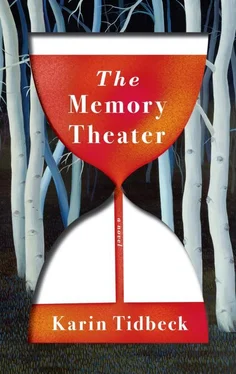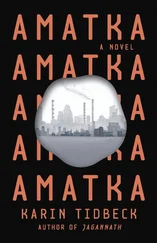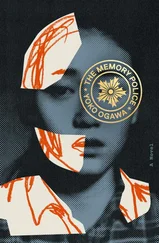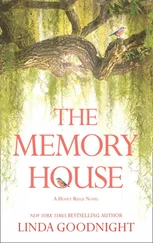Thistle washed his face, smoothed back his locks, and buttoned his coat with shivering hands. His makeup had smeared everywhere. He produced a handkerchief from his breast pocket and dipped it in the water, then rubbed it over Dora’s face.
“You’ve got crumbs and sand all over.”
Dora took the handkerchief from him. “You’ve got paint all over,” she said.
She scrubbed his face until it was pink and raw but clean. He looked like a new person.
“You have freckles,” Dora observed. “And stubble.”
Thistle felt his jaw. “I do.”
He caught her hand and held it against his face for a moment. His skin felt like rough velvet.
Thistle sighed into her hand and turned his eyes to the plain. “How far do we have to walk?”
“Straight ahead, like she said.”
“But what if we get turned around? What then?”
“We ask someone.”
“How do we even know there are people out there we can ask, Dora?”
“I don’t know.”
“But what if we…”
“Stop.” Dora let her hand fall. “We don’t know. It’s all right.”
“You don’t seem worried at all,” Thistle said.
“I’m good at not knowing,” Dora replied.
There was a line on the horizon. They walked toward it.
—
Eventually, they came to a lake with a stone beach. It was so big that Dora couldn’t see the other side. In the distance on their left, a tower stuck out of the waterline. As they came closer, it became clear that it was a ruin, built out of something that looked like crumbly stone. There was a ground floor and a second floor, but the roof was gone. Rods stuck out of the top at crooked angles. A half-submerged opening faced the lake. Dora picked up her skirts and waded into the water. It was cool against her legs, the shingle under her feet smooth and slippery.
“It’s too cold,” Thistle said from the waterline.
Dora looked over her shoulder. “Not for me.”
“Be careful!” he called after her.
The room inside was empty. Snatches of pictures were stuck to the walls here and there: a sun, the profile of a woman cradling a child, a row of clenched fists. At the back of the room was a doorway, corked with debris from where the ceiling had collapsed. Next to it, a set of stairs led up.
On the next floor, two corridor stumps stretched out like a V under the bare sky. The left one had fallen in on itself to cover the door below. Dora turned right. The floor ended after just a few steps. In the room below, heaps of debris stuck out of the clear water. There was no sign of life: no moss, no lichen, no fish swimming in the ruin. Dora picked up a lump of rock and dropped it into the water. It made a loud splash that echoed against the walls.
“Anything?” Thistle called as she waded back outside.
Dora shook her head and made her way back to the shore. Thistle knelt and wrung out her skirts. She had forgotten to hike them up on the way back.
“I don’t understand how you’re not freezing.” He shook the water off his hands and stuck them in his armpits.
“Are you cold?”
Thistle nodded.
Dora wiggled one of his hands free, then turned her back to him and put his hand on her shoulder.
“Come on,” she said, and squatted. “Get up.”
“I’m not that little anymore.”
“Get up,” Dora repeated.
Thistle sighed and climbed onto her back. She hooked her arms under his knees and walked up into the grass, then set off along the shore, the lake on her right-hand side.
In the distance, a black thread lay stretched across the plain. One end disappeared into the water, the other continued as far as Dora could see. When they came closer, it became clear that it was some sort of pipe, big enough that Dora could have crawled inside. Inland, on the horizon, stood what looked like domes lit from within. Thistle hopped down from Dora’s back and walked beside her toward the buildings.
Closer up, the domes looked like puffy beetles; beyond them stood squat buildings with tiny windows. In the center rose a tall tower, like the one by the lake but bigger and whole. People moved between the structures. They were dressed for work, in flat earthy shades, walking with their faces turned downward. One of them glanced up as Dora and Thistle approached, and let out a thin scream. Others looked up, too, and stared at them with wide eyes. They all retreated.
Thistle halted. “They don’t want us here,” he said.
“Could this be the help Ghorbi talked about?” Dora took a few more steps.
“I don’t know if…” Thistle said, and then grabbed Dora’s arm. “Look.”
A small group came walking out between the domes: four men and women, armed with poles and shovels. They stopped a little distance away, close enough that Dora could see their angry faces.
“Who are you?” a short woman shouted.
“I’m Dora,” said Dora loudly.
Thistle poked at her arm. “Dora, don’t.”
One of the men leaned over and mumbled something in the short woman’s ear. She shook her head and stepped closer. Her face was furrowed; her eyes were sharp.
“You don’t belong here,” she said, “do you.” Her accent was nasal and choppy.
“We mean no harm,” Thistle said. “We’re just looking for someone.”
The woman looked over her shoulder at the others, who shook their heads and made waving motions with their hands.
“You won’t find anything here,” the woman said.
“We’re looking for some people,” Dora said. “A theater troupe. They’re supposed to help us.”
“No one here but us,” the woman replied. “You’re not here either. You don’t belong. You’re not real.”
“Please,” Thistle said, and took a step toward the woman.
The woman raised her pole as if to hit him. Dora stepped between them. She tore the pole from the woman’s hands and snapped it in two. The woman gasped and retreated.
Dora looked down at her. “You won’t touch him.”
The woman broke into a run. Dora and Thistle watched as the three others raced after her.
“How did you do that?” Thistle asked. “You’re so strong.”
“I am,” Dora agreed. “I couldn’t protect you properly against the lords and ladies. I will protect you here.”
“We won’t find out if Augusta is there,” Thistle said.
“They said she wasn’t.”
“They could be lying.”
The short woman was coming back. She had more people with her this time. Dora planted her feet on the ground, ready to defend herself and Thistle.
“They’re too many,” Thistle said. “Let’s go.”
The crowd didn’t follow. Dora and Thistle continued walking along the waterline until they reached a tongue of land. The stones were bigger there, and a pile of them formed a sort of wind shelter. Dora sat down to inspect her feet. They seemed all right, if a little sore. Thistle leaned back against the rock and hugged his knees. They sat in silence for a while, until the water changed.
It happened in time with the approaching twilight. With a crackling noise, tendrils spread across the water like a web, until they became so many that they covered the surface completely. Then the surface suddenly cleared. In the ebbing light, it looked absolutely black.
Dora tried the ice with her foot. It made a dull noise as she banged her heel against it. It was cold, but not terribly so. She thought she could see a shimmer in the distance. It looked almost like a string of starry sky.
“We could walk on this,” Dora said.
So they did.
—
They came to the end of the cloud cover, and a sudden spray of stars glimmered in the heavens. A huge striped sphere hung up there, bigger than Dora’s fist.
“I have a memory,” Thistle suddenly said. “It was cold, and I was on a frozen lake. There was a little round hole in the ice. I think we were fishing.”
Читать дальше










![Карин Тидбек - Аматка [ЛП]](/books/438406/karin-tidbek-amatka-lp-thumb.webp)

